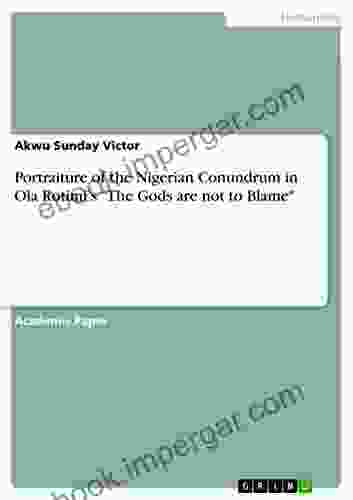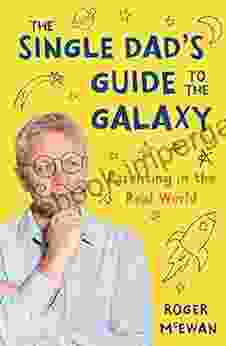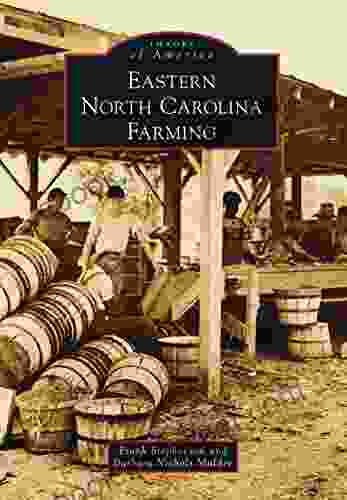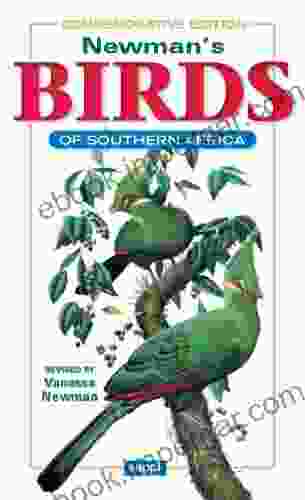Portraiture of the Nigerian Conundrum in Ola Rotimi's "The Gods Are Not To Blame"

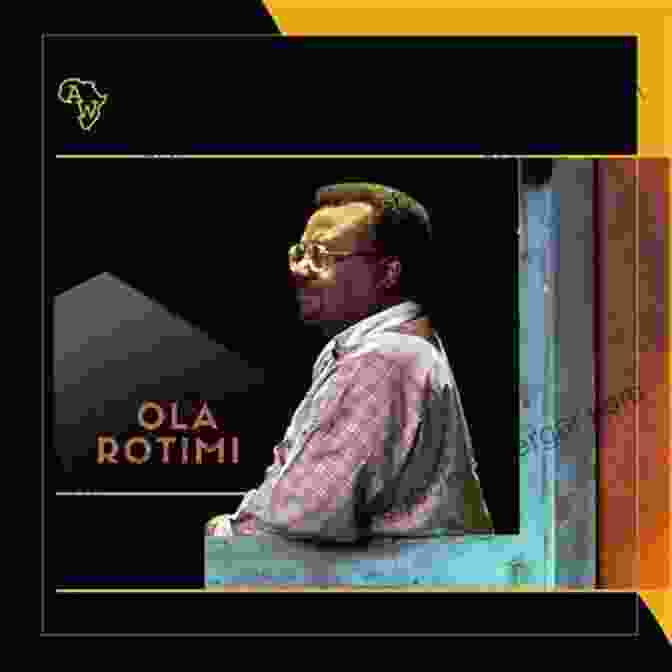
Photo by National Theatre, Lagos
In the tapestry of African literature, Ola Rotimi's "The Gods Are Not To Blame" stands as a formidable masterpiece, weaving together the intricate threads of Nigerian history, cultural identity, and contemporary issues. Through the lens of Yoruba mythology and the turbulent events of Nigeria's post-independence era, Rotimi paints a vivid and thought-provoking portraiture of the Nigerian conundrum.
4 out of 5
| Language | : | English |
| File size | : | 717 KB |
| Text-to-Speech | : | Enabled |
| Screen Reader | : | Supported |
| Enhanced typesetting | : | Enabled |
| Word Wise | : | Enabled |
| Print length | : | 35 pages |
Historical Context: The Shadows of Colonialism and Independence
Set against the backdrop of the Yoruba Kingdom in the 19th century and the nascent Nigerian state in the mid-20th century, "The Gods Are Not To Blame" mirrors the historical trajectory of Nigeria. The play opens with the arrival of British colonialists and their disruption of the traditional Yoruba society. Rotimi skillfully juxtaposes the wisdom and cultural richness of the Yoruba with the arrogance and exploitation of the colonizers, highlighting the fundamental clash of values that shaped Nigeria's colonial experience.
The play's main protagonist, King Odewale, embodies the complexities of Nigeria's post-independence leadership. An idealistic and well-intentioned ruler, Odewale's reign is plagued by corruption, infighting, and political instability. Through Odewale's struggles, Rotimi exposes the challenges and contradictions of nation-building in a country still grappling with the legacy of colonialism and the search for its own identity.
Cultural Identity: Tradition, Modernity, and the Search for Balance
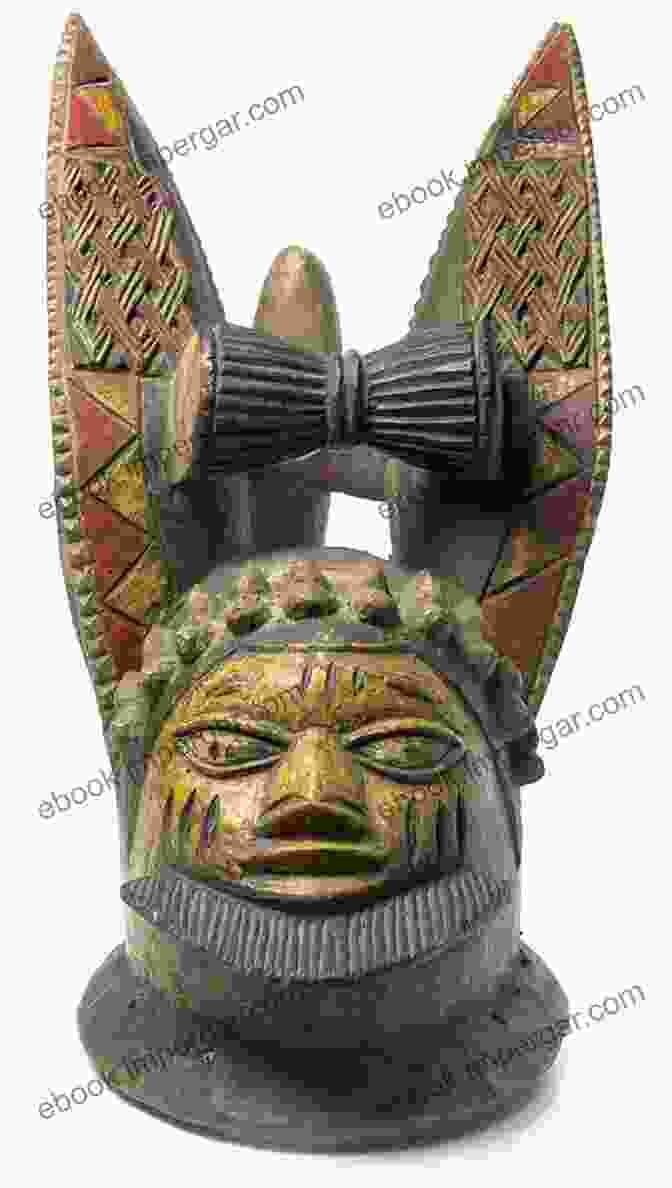
Photo by Pierre Adenaike
"The Gods Are Not To Blame" delves deeply into the intricate web of cultural identity in Nigeria. Rotimi draws upon Yoruba mythology and oral traditions to explore the enduring power of traditional beliefs and practices. The play's characters navigate a complex landscape where ancient rituals and modern values intersect, and where the tension between tradition and modernity is palpable.
Through the character of Aderopo, Odewale's beautiful and enigmatic wife, Rotimi examines the role of women in Nigerian society. Aderopo embodies both the strength and vulnerability of women, and her journey reflects the struggles and triumphs of Nigerian women in a patriarchal and often oppressive society.
Contemporary Issues: Corruption, Social Inequality, and Political Instability
Rotimi's play is not merely a historical drama; it also serves as a scathing indictment of the corruption, social inequality, and political instability that have plagued Nigeria since independence. Through the character of Chief Elesin Oba, a ruthless and power-hungry politician, Rotimi exposes the greed and amorality that have undermined Nigeria's progress.
The play's portrayal of social inequality is equally stark. The poor and marginalized of society are voiceless and powerless, while the wealthy and privileged exploit them for their own gain. Rotimi's critique of Nigeria's social Free Download is a call for justice and a more equitable distribution of resources.
Political instability is another recurring theme in "The Gods Are Not To Blame." The play's climax revolves around a military coup, which topples Odewale's government and plunges the country into chaos. Rotimi's portrayal of the coup is a chilling reminder of the fragility of democracy and the dangers of military intervention in politics.
: A Legacy of Relevance and Insight
Ola Rotimi's "The Gods Are Not To Blame" is a literary masterpiece that transcends time and continues to resonate with Nigerian readers and audiences today. Through its rich tapestry of history, culture, and contemporary issues, the play offers a profound and multifaceted portrayal of the Nigerian conundrum.
Rotimi's work is a testament to the power of literature to reflect, critique, and inspire. "The Gods Are Not To Blame" is not only a gripping theatrical experience but also an invaluable resource for understanding the complex forces that have shaped Nigeria's past, present, and future.
As one character in the play says, "The gods are not to blame for our misfortunes. We are the architects of our own destiny." Rotimi's play serves as a reminder of our collective responsibility to address the challenges facing Nigeria and to build a more just, equitable, and prosperous society for all.
"The play is a parable, a cautionary tale about the dangers of hubris and the importance of humility. It is a story that is as relevant today as it was when it was first written."
- Nobel Laureate Wole Soyinka
4 out of 5
| Language | : | English |
| File size | : | 717 KB |
| Text-to-Speech | : | Enabled |
| Screen Reader | : | Supported |
| Enhanced typesetting | : | Enabled |
| Word Wise | : | Enabled |
| Print length | : | 35 pages |
Do you want to contribute by writing guest posts on this blog?
Please contact us and send us a resume of previous articles that you have written.
 Book
Book Novel
Novel Page
Page Chapter
Chapter Text
Text Story
Story Genre
Genre Reader
Reader Library
Library Paperback
Paperback E-book
E-book Magazine
Magazine Newspaper
Newspaper Paragraph
Paragraph Sentence
Sentence Bookmark
Bookmark Shelf
Shelf Glossary
Glossary Bibliography
Bibliography Foreword
Foreword Preface
Preface Synopsis
Synopsis Annotation
Annotation Footnote
Footnote Manuscript
Manuscript Scroll
Scroll Codex
Codex Tome
Tome Bestseller
Bestseller Classics
Classics Library card
Library card Narrative
Narrative Biography
Biography Autobiography
Autobiography Memoir
Memoir Reference
Reference Encyclopedia
Encyclopedia Ken Taylor
Ken Taylor Kevin L Williams
Kevin L Williams Kevin Grange
Kevin Grange Kimberly A Scott
Kimberly A Scott Kelly Ritter
Kelly Ritter Kenneth Paul Rosenberg
Kenneth Paul Rosenberg Kevin T Patton
Kevin T Patton Kenney F Hegland
Kenney F Hegland Kevin Pharris
Kevin Pharris Kenneth Koh
Kenneth Koh Ken Gerhard
Ken Gerhard Kevin Lewis
Kevin Lewis Kenneth Weisbrode
Kenneth Weisbrode Kim Cooper
Kim Cooper Ken Goudsward
Ken Goudsward Kevin Volkan
Kevin Volkan Kevin Gosner
Kevin Gosner Kevin Flynn
Kevin Flynn Ken Beck
Ken Beck Kevin Kelly
Kevin Kelly
Light bulbAdvertise smarter! Our strategic ad space ensures maximum exposure. Reserve your spot today!
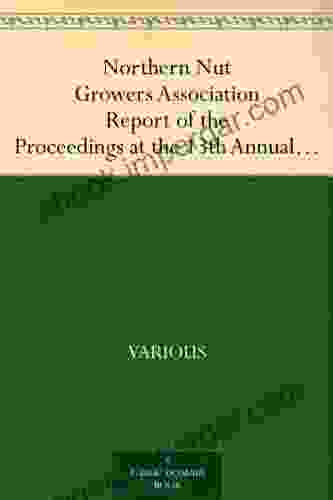
 Forrest ReedUnveiling the Secrets of Nut Growing: A Comprehensive Guide from the Northern...
Forrest ReedUnveiling the Secrets of Nut Growing: A Comprehensive Guide from the Northern... Jay SimmonsFollow ·4.5k
Jay SimmonsFollow ·4.5k Ron BlairFollow ·2.4k
Ron BlairFollow ·2.4k Dillon HayesFollow ·8.6k
Dillon HayesFollow ·8.6k Nathaniel HawthorneFollow ·17.6k
Nathaniel HawthorneFollow ·17.6k Eric HayesFollow ·10.1k
Eric HayesFollow ·10.1k Rick NelsonFollow ·14.2k
Rick NelsonFollow ·14.2k Vincent MitchellFollow ·11.4k
Vincent MitchellFollow ·11.4k Christopher WoodsFollow ·14.8k
Christopher WoodsFollow ·14.8k

 Chadwick Powell
Chadwick PowellDiscover the Secrets of Optimal Health with "The Healthy...
Preface: Embark on a Transformative...
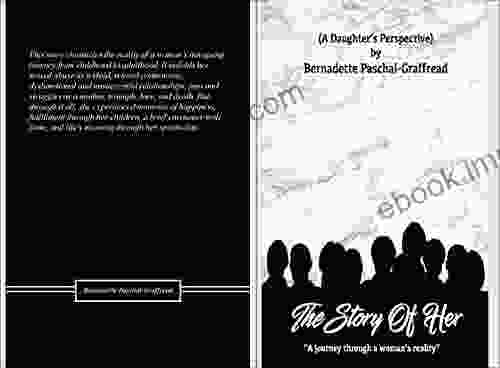
 Andres Carter
Andres CarterUnveiling the Profound Journey of Womanhood: A Daughter's...
In the tapestry of...
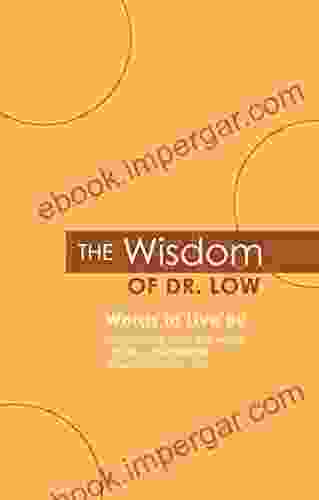
 Travis Foster
Travis FosterWords to Live By: The Essential Guide to Finding...
Words have the power to shape our...
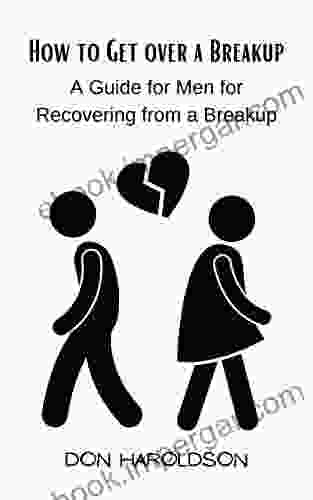
 Chinua Achebe
Chinua AchebeThe Ultimate Guide for Men to Recover from a Breakup
: Breakups are never...
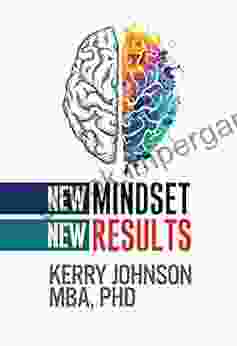
 Spencer Powell
Spencer PowellNew Mindset, New Results: The Proven Path to Unleashing...
About the Book ...
4 out of 5
| Language | : | English |
| File size | : | 717 KB |
| Text-to-Speech | : | Enabled |
| Screen Reader | : | Supported |
| Enhanced typesetting | : | Enabled |
| Word Wise | : | Enabled |
| Print length | : | 35 pages |


